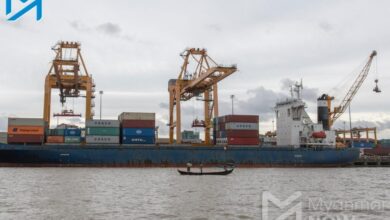
Following the announced sale of Telenor Myanmar to Lebanon’s M1 Group, the Norwegian government is keeping a distance from the company’s decision to pull out of Myanmar.
The government is the majority owner of Telenor Group with a 53.97% stake. Folketrygdfondet, the domestic fund manager of Norway’s state pension fund for domestic investment is Telenor’s second biggest shareholder, at 4.44%.
Telenor’s sale has caused controversy because of M1’s history of business with brutal regimes, its investment in Irrawaddy Green Towers, a company that leases phone towers to military-owned Mytel, and concerns over the transfer of personal data of the network’s 18 million subscribers in Myanmar.
In an official response to an open letter from 464 civil society organisations demanding a halt to the sale, Norway’s Minister for Trade and Industry Iselin Nybø said that Telenor’s investment and operations are the responsibility of the company’s board.
“Questions related to the investment should therefore be raised with Telenor,” the minister wrote.
However, members of parliament, experts and campaigners continue to criticise Telenor’s Telenor’s decision and a complaint has been submitted to the OECD National Contact Point alleging irresponsible disengagement.
Some are also criticising the Norwegian government’s standoffish approach.
“The current government’s policy of not intervening in Telenor’s investments and operations does not, in this context, sit well with the state duty to protect human rights under the UN Guiding Principles on Business and Human Rights,” said Lucy Purdon, policy director at the campaign group Privacy International.
According to the UN Guiding Principles, states should take extra steps to prevent human rights violations linked to companies they control. The guidelines warn that human rights abuses by state-owned enterprises can count as violations of a state’s international human rights obligations.
Iselin Nybø, the Norwegian minister for trade and industry, told Myanmar Now that the government expects its businesses to act responsibly and protect human rights, but defers to Telenor’s management over its decision to exit Myanmar.
“The state’s authority as owner is exercised through the general meeting, and the state as an owner does not have any authority in the company outside the general meeting,” she said.
“The management of the company falls within the authority of the board of directors and the general manager, and they are also responsible for managing Telenor’s operations in Myanmar. It is up to Telenor itself to assess the situation and consider the best available options,” she added.

However, Telenor’s Myanmar sale was not put to a vote at its last annual meeting, which was held on May 27, more than a month before the company’s announcement that it was pulling out of the country.
Nybø did not disclose whether she had seen Telenor’s human rights due diligence related to its Myanmar sale.
Myanmar Now asked Folketrygdfondet about human rights concerns over Telenor’s Myanmar sale and the fund’s response.
Folketrygdfondet’s equities chief Nils Bastiansen told Myanmar Now that Myanmar has been raised in the fund’s dialogue with Telenor.
“We will continue to monitor the situation and expect the company to take appropriate action in the shareholders’ best interest,” he said.
Bastiansen did not respond when asked if they had seen due diligence regarding the company’s Myanmar exit.
Member of parliament and deputy leader of the Socialist Left Party Torgeir Knag Fylkesnes raised concerns with the government over Telenor’s human rights due diligence and said that Trade Minister Nybø’s response to the civil society open letter was inadequate.
“For now we still do not have enough information regarding the sale and the due diligence conducted to reach a clear verdict about whether the government should intervene in the sale. We have challenged the minister to follow up on the civil society concerns with Telenor, and demand that they thoroughly account for the due diligence conducted, and why they have decided to sell to the controversial M1 Group,” he said.
Fylkesnes told Myanmar Now that he has not seen Telenor’s human rights due diligence related to its Myanmar sale.
Speaking to Dagens Nyheter, Ola Elvestuen, Liberal Party member and leader of the parliament’s Myanmar Network, suggested Telenor should consider freezing or winding up its Myanmar investment rather than selling to M1.
Elvestuen did not respond to requests for comment.

Stein Tønnesson, a peace researcher at PRIO with experience of Myanmar, criticised the trade minister’s response to civil society and expressed fear for Telenor Myanmar staff and customers.
“[Minister Nybø] cites Telenor for stating that it had evaluated all options and for believing that the sale was ‘the best possible option in this situation.’ I disagree with that assessment. In my opinion, the best option would have been to refuse to hand over user data to the military authorities and accept the risks that would entail,” he said.
Tønnesson said the government’s approach follows a norm of Norwegian state ownership after privatisation, where the state created shareholder companies, continuing to hold a majority stake under autonomous management, and suggested the government should commission an independent report into the consequences of Telenor’s Myanmar exit.
When asked for comment, other members of parliament backed the government’s approach.
Terje Aasland, a member of parliament for the Labour Party, and the second vice chair of the Standing Committee on Business and Industry, expressed support for Telenor’s management and the government’s response.
“I feel confident that the Norwegian government has taken the appropriate steps to ensure that the sale does not violate any of the Norwegian government’s responsibilities,” he said.
The Labour Party is tipped to defeat the ruling conservative coalition when Norway goes to the polls on September 13.
Hans Fredrik Grøvans, parliamentary leader of the Christian Democratic Party, which is part of the ruling coalition, said the responsibility sits with Telenor’s board, according to Norwegian legislation and practice.
He expressed concern about the situation in Myanmar, discussed in talks with Telenor.
“We have been assured by Telenor that the historical data that are part of the sale does not contain any information on content of the communication, and that neither Telenor Myanmar nor Telenor Group have any records of what has been said in a call or written or received in messages or emails,” Grøvans told Myanmar Now.
However, call data records will be transferred to M1 as part of the sale. This includes the time and date of a call, the phone numbers of the parties, the call duration, the type of call (such as voice or SMS) and the place of a call. The location data relates to which tower or site a call is made from and to where.
Phone numbers in Myanmar are linked to identity due to SIM card registration rules that came into force in June 2020, causing concern among civil society and privacy advocates.
Sivert Bjørnstad, part of the Standing Committee on Business and Industry and a member of the libertarian Progress Party, formerly part of the conservative-led coalition, said the government should stay out of business decisions, while describing Telenor’s decision to enter the Myanmar market in the first place as “risky”.
“It would be unprecedented and highly improbable for the government to veto Telenor’s decision. It is also not desirable in my view that the government interferes in the decision-making process of a company, even though it is a majority shareholder,” he said.
“I hope that the OECD complaint supported by the hundreds of Myanmar civil society organizations has made an impact on Telenor, and I would strongly encourage Telenor to do everything in their power to work for the best interests of their customers, which includes protecting their personal data,” he added.
Telenor’s Myanmar sale has been heavily criticised in Norwegian media but has so far not been an election issue.
Lucy Purdon of Privacy International hopes that will change.
“I make a direct plea to MPs to raise this issue up the political agenda and help come up with a solution that will allay the very real fears of the people of Myanmar, people that Norway has long supported on the road to democracy. Please don’t abandon them now,” she said.



